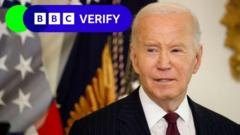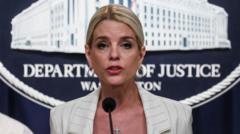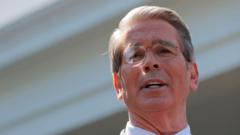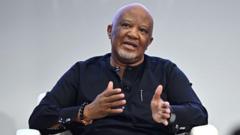Following Hunter Biden's felony convictions concerning gun and tax charges, President Joe Biden has issued a surprise pardon, drawing ire from Republicans who recall his previous denials of any intention to grant clemency. This controversial move not only ignites debate over the legitimacy of presidential pardons but also casts a new light on Biden's previous stance regarding the independence of the justice system.
Biden's Controversial Pardon for Son Hunter Sparks Outrage and Doubts

Biden's Controversial Pardon for Son Hunter Sparks Outrage and Doubts
President Joe Biden's unexpected pardon for his son Hunter, amid past statements denying intervention, raises questions on justice and presidential powers.
Following the summer conviction of Hunter Biden on federal felony gun and tax charges, the White House had maintained that President Joe Biden would not consider a pardon for his son. However, in a surprising turn of events, President Biden announced a sweeping pardon recently, arguing that Hunter had been victimized by politically motivated attacks. This decision has prompted strong backlash from Republican leaders, who highlight his earlier commitments to abstain from intervening on his son's behalf.
In June, when pressed about ruling out a pardon, President Biden had firmly stated, “Yes,” indicating his intent to respect the jury's decision. Continuing with this sentiment, Biden added during a G7 summit: "I will abide by the jury decision, and I will not pardon him."
However, just days before Biden's pardon, administration representatives reiterated that the President had no plans to assist Hunter. At a press conference, White House Press Secretary Karine Jean-Pierre echoed this sentiment, emphasizing that the answer had been consistently “no.”
Biden’s pardon for Hunter, emphasizing a “miscarriage of justice,” stands in stark contrast to his previous assertions of Hunter receiving a fair trial. While presidential pardons are not uncommon, Biden's action represents an unprecedented move, as no prior president has ever pardoned their own child.
The breadth of this pardon has raised eyebrows; it encompasses any crimes committed by Hunter from January 2014 through December 2024. Jeffrey Crouch, a political expert, noted that it is highly atypical for a pardon to cover such an extensive timeframe and to happen before sentencing, which Hunter faces later this month.
Historically, there have been examples of presidents pardoning relatives, such as Bill Clinton pardoning his half-brother and Donald Trump granting clemency to Charles Kushner, father of his son-in-law, Jared. However, the unique nature of Biden's pardon adds an extra layer of complexity to the ongoing discussion about the use of presidential power and the supposed independence of the judicial system.
In the past, Biden has publicly criticized similar pardons issued by Trump, labeling them undemocratic and corrupt. He has called into question the integrity of the attorney general's office under Trump's administration, emphasizing its role as the people's lawyer as opposed to the president's personal advocate.
The fallout from Biden's recent decision continues to unfold as observers and political analysts grapple with the implications for both Hunter Biden and the broader justice landscape in the U.S.






















